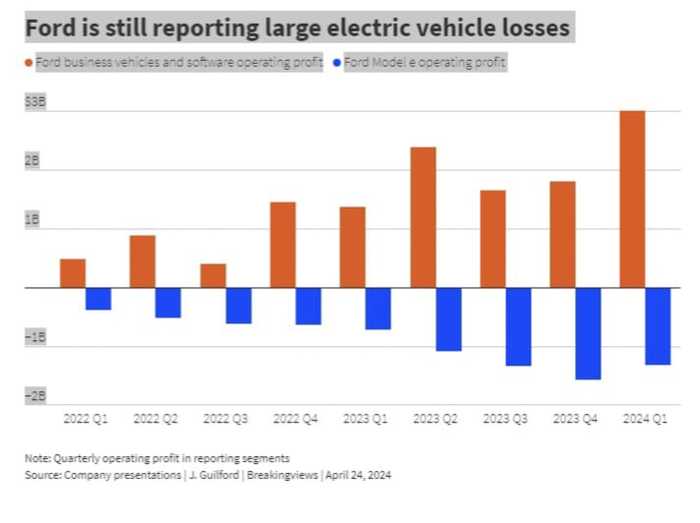Published 21:56 IST, April 25th 2024
Detroit’s revenue engines finally start to fire
Ford Motor and General Motors’ combined US sales of electric vehicles haven’t grown since late 2022, despite them investing billions of dollars.
- Republic Business
- 2 min read

Changing lanes. Detroit’s remake has ended up a little differently than expected. Ford Motor and General Motors’ combined U.S. sales of electric vehicles haven’t grown since late 2022, despite them investing billions of dollars. Look closer at the first-quarter results they reported this week, though, and their revenue engines are starting to fire, and in helpfully different ways.
True, on the face of it, the shift to electric vehicles doesn’t seem to be doing them any favors. At Ford’s electric Model e segment, operating losses were over 10 times greater than revenue, which slumped. At GM, first-quarter U.S. electric sales are roughly where they were in 2022’s fourth quarter, a paltry 16,425 vehicles versus full-year aspirations of up to 300,000, according to Cox Automotive.
There’s more happening under the hood. GM boss Mary Barra has said electric efforts depend on rolling out the company’s Ultium battery design, giving it greater control over costs. After many stumbles, that’s finally happening. GM’s electric sales of the money-bleeding Chevrolt Bolt are falling as the company ditches the hatchback, with new vehicles rising along a promising growth curve. That’s important: GM says these models will finally cover their per-unit costs. At Ford, meanwhile, boss Jim Farley has U-turned faster than his rival on the pursuit of rapid electric-vehicle growth, further cutting back forecast capital expenditure.
It’s good for both companies to stay out of each other’s way. GM’s proliferating lineup hits the high end as well as models competing more directly with Tesla. Ford’s lineup tilts to electric pickups and commercial Transit vans. And that latter part of that formula is going very well: Ford Pro, which sells gas- and battery-powered trucks like the Transit to business and government customers, saw operating profit leap 120% year-over-year. Thanks to software and services that Pro tacks on, its operating margin of nearly 17% is roughly quadruple the profitability of Ford’s main gas-guzzler business. And it’s an electric business that’s growing nicely – electron-slurping Transit sales are up 148% year-over-year, Cox reckons.

Updated 21:56 IST, April 25th 2024